Wildfires Have Far-reaching Effects
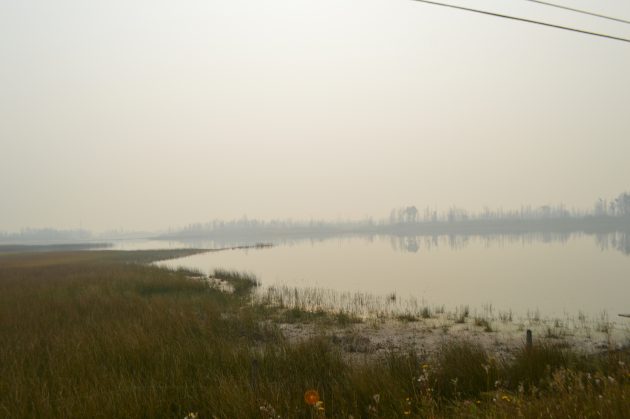
The north side of 70 Mile, one of several phots taken late this week by 250 News.
Prince George, B.C. – The intense, prolonged period of wildfires in the BC interior this summer is affecting many areas, not the least of which are human health and weather conditions themselves.
First off, Paula Tait, a Health and Resource Development Technical Advisor (Air) with Northern Health clarifies that when the experts refer to a period of time as “prolonged” they are speaking in terms of several years, not months as in the case with the BC wildfire outbreak which began in early July. Wildfire smoke is considered a short term exposure.
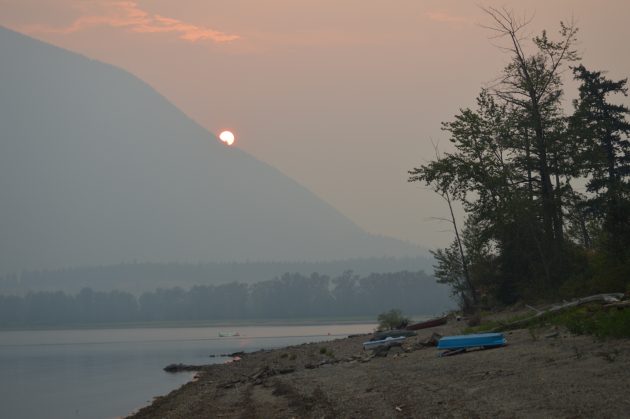
Tappen, B.C. between Sorrento and Salmon Arm
“But it’s all relative,” says Tait “everybody reacts differently to the air pollution. So, for a couple of months, if you’re somebody who has asthma you are going to be in a much worse position than somebody who is much healthier. Something about smoke, too, is that it’s highly variable and changes very quickly so we get these short peaks and then it falls off and peaks again and so on.”
She says particulate matter from smoke and other sources is a full-body pollutant. The most well-established effects are related to respiratory and cardiovascular diseases and there is more evidence being gathered on effects such as dementia, poor mental health, low birth weights and others. She says it is longer term exposures that cause greater number of more serious or chronic health conditions. And doctors have seen increases in asthma-related visits and medication requests that coincided with higher smoke days.
Tait says while it is too early to know the full extent of health impacts from this summer’s fires provincial health experts will be going over the data to analyse those impacts.
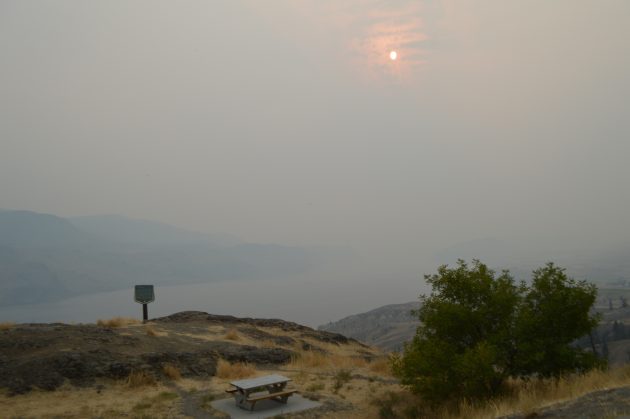
6 Mile Point rest stop near Savona, looking east toward Kamloops
Environment Canada meteorologist Doug Lungquist in Kelowna says the heavy smoke has a direct effect on the weather. Light winds, he says, “are part of the reason the smoke (in the interior) is so bad. We didn’t have enough systems to flush the smoke out so what happens is the smoke king of settled in, it’s all the way from Oregon, Washington and into the Central Interior. The problem with that layer of smoke is it reduces the amount of sunshine that reaches the ground, the heating that we’ll get at the surface.”
“So the surface is cooler, but higher up in the atmosphere that smoke is absorbing the sunshine and warming the atmosphere aloft, so it ends up making a stronger inversion. The inversion strengthens, sort of like we would see in the winter than in the summer, it makes the winds lighter at the surface, makes it cooler because of that and certainly does affect the weather.”
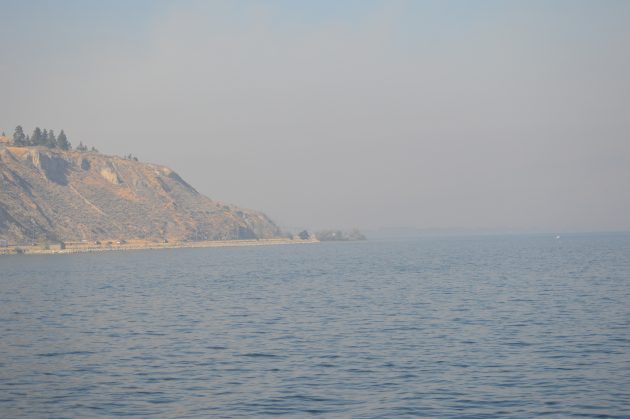
On Okanagan Lake looking north from Penticton toward the Finlay Creek fire at Peachland
Lundquist adds “it even makes it a bit more stable so it’s less likely that we’ll get development of showers or thundershowers because there’s this boundary or layer at the lower part of the atmosphere that is colder, and sometimes you need the heat of the atmosphere to produce the showers in the summer. So lighter winds, less sunshine, definitely cooler at the lower elevations and less chance of showers because of that smoke.”
Lundquist says a cold front move through the central part of the province should help clear some of the smoke “but there are fire everywhere so even though the general atmosphere will clear it doesn’t mean there won’t be smoke around because of all of these sources, all the way from Oregon to the Central Interior. So it’ll be a little better in the next couple of days but if you’re near a fire or downwind of a fire it can be nasty and really thick.”
“I think the number one thing is too keep track of the health issues, especially if you have respiratory and other related health issues.”
Those most vulnerable to poor air quality are children, the elderly, pregnant women and those with chronic illnesses.
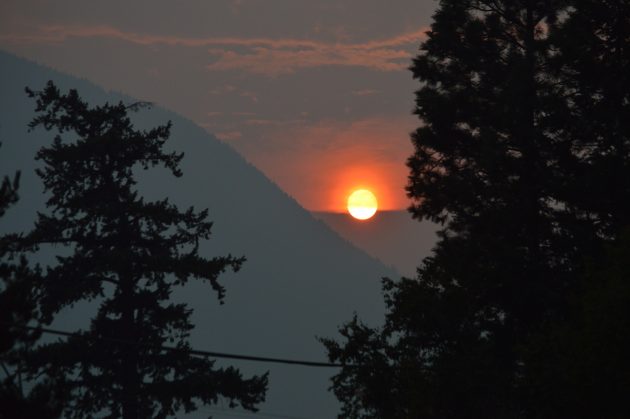
Sunset at Tappen
Paula Tait adds “it’s important to keep in mind that we’ve been fairly lucky here in the north, in Prince George. We’ve been impacted some but to the south in the interior they’re impacted a lot more heavily than we have been.”

Comments
Comments for this article are closed.